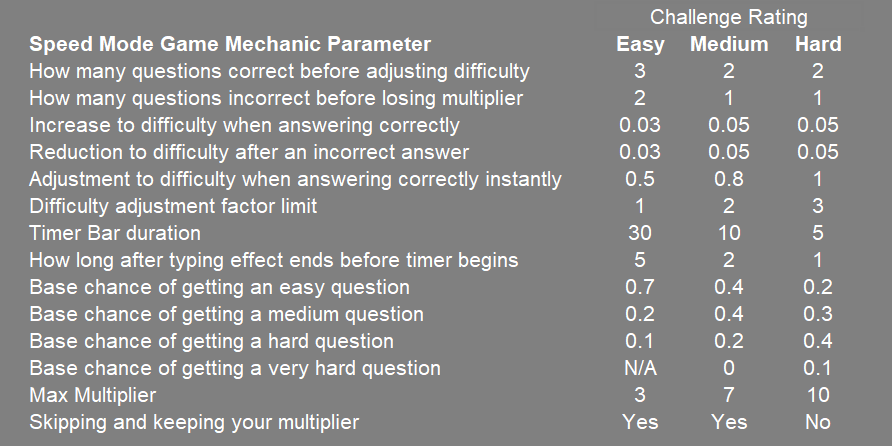Epimythos has over 370 multiple choice and over 130 verbose questions, bringing the total to over 500, with more questions being added as development and updates continue. Multiple choice questions are handcrafted, with answers that can fall into one of 30 some categories, from individual characters to groups, locations, even ideas. The multiple choice engine is used for both the Speed and Discovery modes. Verbose mode takes a different approach, by asking the player to type in an answer. If the first three letters of the answer matches, the input field is replaced by a sleek and glossy answer button, which will send you on to the explanation with a burst of stars when you press it.
Speed mode is a points based challenge that tests your overall knowledge. By contrast, Discovery and Verbose can be played within categories like Heracles, Iliad and Odyssey, or Tragedy and Lovers.

Technical Tales
If you would like to know how Epimythos evolved from the dev perspective, check out my dev journey here.
Speed Mode
Speed Mode is multiple choice with four options per question. Each question is framed to present answers that conform to one of over 30 categories of answers, from beasts and monsters to geographical locations, names of gods and mortals, and even groupings of such. This allows the game to dynamically generate two fitting incorrect answers for two of the question options. In addition, a third incorrect answer comes in the form of a deceptive “curveball” selected for its incorrectness and plausibility, hand-picked to truly test your knowledge.
If you are unsure, there is a Skip button although its true purpose will be explained further on.
Speed Mode is scored, with support for online leaderboards planned. You can select up to 100 questions per run. While you can’t filter by category in Speed Mode, category metadata is still tracked and used to trigger specific achievements.
Anti-Repetition Filters
To reduce the odds of seeing similar topics repeatedly in a session, Speed Mode features optional anti-repetition filters. These group certain questions (like all those involving Achilles’ heel) into filter groups. If the group has already appeared in the round, the game applies a cooldown—either hiding repeats or bumping them further down the question queue.
If you’re playing a round with more than 40 questions, filters apply a cooldown rather than outright blocking. While not all questions are part of a group, the existing filters do a solid job of keeping variety high.
Question Difficulty Ratings
Each question is rated from Easy to Very Hard.
- Easy: Common knowledge—major gods, famous events
- Medium: Key myths, deeds, identifying figures less known outside enthusiasts
- Hard/Very Hard: Muses, lesser heroes, obscure actions or names
Harder questions award more points.
Challenge Adjustment Algorithms

When you select a difficulty level—Easy, Medium, or Hard—you’re choosing a challenge algorithm that governs how questions escalate. The game doesn’t directly factor in the difficulty of the previous question. Instead, it responds to whether you answered correctly and whether you’re on a streak.
- On Easy, you’ll mostly see Easy and Medium questions.
- On Medium, difficulty can climb steadily, including occasional Hard questions.
- On Hard, Easy questions vanish fast, and Very Hard questions become more likely.
Difficulty increases (or decreases) in real time based on your performance, using adjustment values specific to each mode.
Also note:
- Easy timer = 30 seconds
- Medium timer = 10 seconds
- Hard timer = 5 seconds
The timer only starts after the question is fully typed and the grace period ends.
Multipliers
Inspired by Streets of Rage, Speed Mode features a score multiplier system. You begin at x1, but each correct answer increases it—especially if answered quickly.
Each difficulty has its own multiplier ceiling:
- Easy: x3
- Medium: x7
- Hard: x10
Answering before the timer bar runs out triggers an instant multiplier bonus, letting you rapidly chain from x1 → x3 → x5 → x7, and so on to x10.
Skipping a question allows you to preserve your multiplier once, except on Hard, where skipping forfeits it entirely. This makes Hard the path to the highest scores—but also the most punishing.
Final Word
Speed Mode is where reflexes, memory, and mythic insight come together. Want a leaderboard-worthy score? You’ll need to know your stuff and play an epic round of 100 questions on Hard mode.
Discovery Mode
Discovery Mode is an educational and relaxed alternative to Speed Mode. There are no timers, no points, and no Skip button—just pure exploration and learning.
Question Style and Answer Logic
Discovery Mode uses the same set of multiple-choice questions as Speed Mode, employing the same dynamic incorrect-answer generation logic (see Speed Mode above). However, Discovery Mode questions are phrased differently, often providing additional context or background information and always forming a complete interrogative sentence.
Instant Feedback and Explanations
When you select an answer:
- Instant Visual Feedback:
- If you selected an incorrect answer, it highlights in red.
- The correct answer highlights in green.
- You have ample time to review the correct answer before manually proceeding by clicking “Next.”
- After clicking “Next,” the game displays a succinct and informative blurb.
- Clicking “Next” again advances you to the next question.
Categories and Visual Immersion
Discovery Mode questions can be filtered by category (e.g., Gods, Heroes, Monsters, Geography). Each category features unique corresponding background imagery, enhancing the visual and thematic immersion of your learning experience.
Anti-Repetition Logic
Unlike Speed Mode, anti-repetition filtering in Discovery Mode is only applied to the larger, broader categories: Gods, Heroes, and General. The filtering system ensures you encounter diverse questions within these expansive groups, providing a consistently fresh experience during lengthy sessions. The decision to make this exception was due to some categories having fewer questions.
Discovery Mode is ideal for casual players, beginners in mythology, or students seeking a stress-free and relaxing mythology experience. It is also ideal for mythology enthusiasts looking for a refresher, either targeting a category or not. It’s designed to let you take your time, learn at your own pace, and delve deeper into the rich tapestry of Greek mythology.
Verbose Mode
Verbose Mode offers an entirely different approach to the Epimythos experience, designed especially for those who seek a deeper engagement with Greek mythology.
How it Works
In Verbose Mode, each question has one or more correct answers, which you enter directly into a provided text input field. Use the mouse to place the cursor and start typing.
Answers are normalized, so extra words like “the,” “king of,” “mount,” or “isle of” are optional. You can type these if you wish, but the game ignores them—they won’t count against the three-character matching threshold. Go ahead and give it a try!
Once you’ve entered at least three matching characters, the input field deactivates and a distinctive answer button appears. Clicking this button releases a cheerful burst of sparkling stars and takes you to an illustrated explanation screen. After reviewing the explanation, simply click anywhere (except on the scrollbar) or press the Enter key to continue to the next question.
Rich Visual Content
Every question in Verbose Mode comes with an illustration. Although I had hoped to primarily use vase art, authentic historical art and photography often presented copyright challenges; approximately 98% of the illustrations were created using AI.
Scoring (Informational Only)
While scoring isn’t the primary focus in Verbose Mode, you’ll still receive 1 point for each correct answer you submit. Your score is displayed as a measure of progress and accuracy, not competition.
Difficulty ratings are included in the question metadata, but these ratings do not influence gameplay directly.
Categories and Customization
In Verbose Mode, you have the flexibility to choose your preferred topic categories—or simply play with all categories included.
Interpretive Questions (Advanced Feature)
Once you’ve demonstrated your mastery by earning two of the five laurel-wreathed achievements, you’ll unlock interpretive questions. These special questions delve deeper into the symbolic, philosophical, and personal interpretations of myths, enriching your mythological journey.
The Argonauts category is particularly abundant with interpretive content, featuring illustrations that are vividly colorful, impressionistic, and designed to evoke imagination and introspection.
Verbose Mode is your invitation to explore Greek mythology on a deeper level—typing answers, absorbing stories, and contemplating interpretations that linger beyond the screen.
